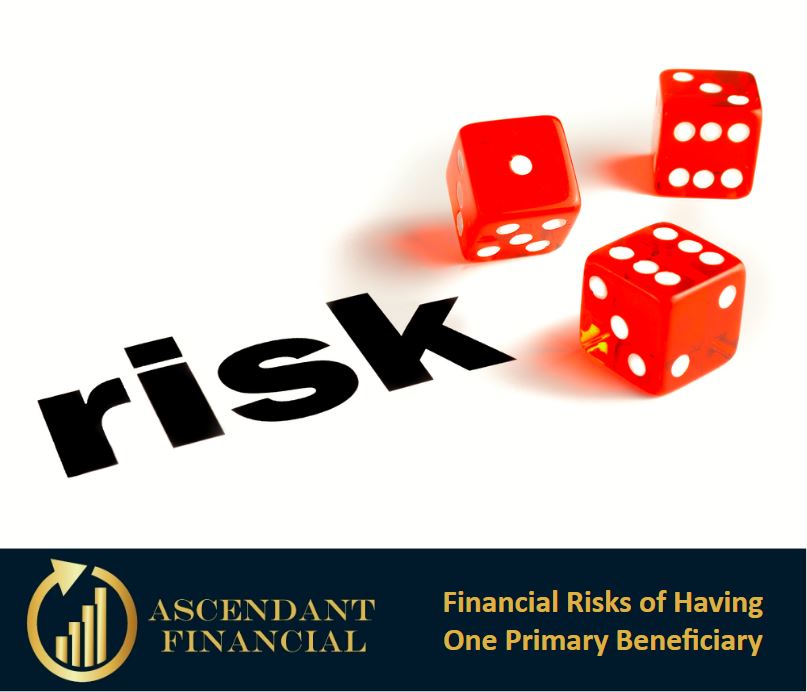When you have a life insurance policy, you may be concerned with dividing up the benefit amount and who will take responsibility for your children or other dependents after your death. Additionally, there will be many obligations that need to be dealt with when you pass away. Therefore, you should always select a beneficiary when you apply for insurance. If you do not, your estate automatically becomes the beneficiary by default. Your estate, which is now subject to probate, could take much longer to settle than expected, and creditors could even claim portions. The result could be disastrous, so you should update your beneficiary designations regularly.

Many Canadians often overlook a huge financial matter as the need to appoint a backup beneficiary. It does not necessarily mean a contingent beneficiary, but it could mean multiple “primary” beneficiaries are selected.
Many Canadians are not aware that you can select more than one primary beneficiary. All listed primary beneficiaries will share 100% of the benefit total to be distributed at death. The amount is divided by the percentage of benefit you selected for each individual. For example, John has a 1,000,000 Life insurance policy. He chooses his wife Sally to be the beneficiary for 90%, and his mother Anita for 10%. If John passes and both of these people are still alive, then Anita gets $100,000 Tax-free, and Sally, his wife, would receive $900,000 Tax-free.
Now, if we assume that Anita passes before John, then she would no longer be able to receive her 10%. Therefore the remaining primary beneficiary listed would now receive 100% of the benefit amount. So Sally now gets a cheque for $1,000,000. This is different than how it works with contingent beneficiaries. A contingent only comes into play when zero surviving primary beneficiaries are left alive.
If you no longer have a primary living beneficiary, The contingent beneficiaries are next in line. But if there is not one listed, then your estate becomes the beneficiary. This could be risky and allow your creditors to fight to access some of this capital and again delay the movement of much-needed funds to your loved ones due to your will's probate process and settlement. Therefore, selecting a contingent beneficiary with every life and health insurance policy is as important as choosing a primary one.
Using our example above, if both Anita and Sally were to predecease John, few things should happen. Firstly, John should be proactive and meet with his insurance Advisor to make changes, update his beneficiaries regularly, and choose new primary beneficiary designations. However, if John were to pass away at the same time as his wife Sally, what would take place then? Let's assume he had listed his two children as back up beneficiaries when he set up the policy, David and Derek, for 50% each. Upon John's death, both of these kids would now receive their share of the proceeds as no primaries listed on the policy contract are still alive. So the contingents become next in line.
This doesn't only apply to life policies. Similarly, when you choose to establish a retirement savings plan, you decide who will be your primary beneficiary.

Most Canadians don't realize that having one primary beneficiary on your will, retirement savings, or insurance coverages could cause problems for your surviving loved ones.
When you have one primary beneficiary, the individual could end up with virtually everything you own, which can become problematic if they were not prepared for this responsibility.
Suppose the beneficiary you had in mind was never involved in financial matters or has a track record of irresponsible spending. There is a high chance that they will spend your funds and use your assets to the disadvantage of the rest of your dependants. Financial stewardship is key, and having quality conversations with your spouse and children about financial matters can be the difference between a legacy that lasts versus being squandered.
In fact, according to Statistics Canada, one in six Canadian adults spend more than they earn every year. Meaning that without proper guidance from you, your beneficiary will likely continue with the financial habits they have built up over time, whether positive or negative.
Another financial risk arises when you choose your spouse as the primary beneficiary of your RRSP, and unfortunately, both of you pass away simultaneously.
The value of the RRSP will form part of your estate as a taxable income. There may not be an option to plan effectively for a spousal rollover that is the most tax beneficial. Therefore, your legal representative will have to pay the taxes before dividing the remaining estate among the rest of your survivors, as you stated in your will. The result is often the most significant tax bill Canadians ever face… the terminal tax bill.
It gets complicated if you die without creating a will. If you don't have a will, or if that beneficiary dies without one, then it's pretty much impossible for these funds to get passed on in the way you would have wanted. So instead, the provincial rules will dictate how funds will are distributed, and there is nothing that any of the survivors can do about it.
Similarly, if you had a life insurance policy with one primary beneficiary and that beneficiary dies after your death, the funds will be part of the beneficiary's estate. Again, this could disadvantage your dependants, especially if the primary beneficiary was not your spouse or a relative. This is where proper estate planning comes in.
The first step to preventing these risks is to choose primary and contingent beneficiaries. Next, check all of your insurance contracts and investment accounts immediately and see if they are up to date. Set an annual calendar reminder to review these and consider listing them in a secure spreadsheet or word document that your spouse would be able to find if need be. Then book a meeting with a qualified insurance advisor such as one of the Authorized Infinite Banking Concept Practitioners at Ascendant Financial.
For further assistance regarding your Beneficiaries, contact Ascendant Financial today and speak with someone from our team of Financial Advisors.

Get Access To Our On-Demand Training To See How You Can Further Understand The Role Of Beneficiaries.








©2023 Ascendant Financial All Rights Reserved | Terms & Privacy Policy | DMCA
© 2023 Ascendant Financial Inc. All rights reserved.
The supporting material, audio and video recordings and all information related to Introduction to Becoming Your Own Banker, The Infinite Banking Concept (IBC) posted on www.ascendantfinancial.ca and all other Ascendant Financial Inc. websites are designed to educate and provide general information regarding The Infinite Banking Concept (IBC) and all other subject matter covered. It is marketed and distributed with the understanding that the authors and the publishers are not engaged in rendering legal, financial, or other professional advice. It is also understood that laws and practices may vary from province to province and are subject to change. All illustrations provided in these materials are for educational purposes only and individual results will vary. Each illustration provided is unique to that individual and your personal results may vary. Because each factual situation is different, specific advice should be tailored to each individual’s particular circumstances. For this reason, the reader is advised to consult with qualified licensed professionals of their choosing, regarding that individual’s specific situation.
The authors have taken reasonable precautions in the preparation of all materials and believe the facts presented are accurate as of the date it was written. However, neither the author nor the publishers assume any responsibility for any errors or omissions. The authors and publisher specifically disclaim any liability resulting from the use or application of the information contained in all materials, and the information is neither intended nor should be relied upon as legal, financial or any other advice related to individual situations.
Family Banking System (FBS)™ is a trademark of Ascendant Financial Inc. © Ascendant Financial Inc., 2024. All rights reserved. The phrase “Live the Lifestyle, Love the Process, Infinite Banking” is a registered copyright (Registration No. 1209863) with the Canadian Intellectual Property Office. Unauthorized use, reproduction, distribution, or copying of this phrase, in whole or in part, without express written permission from Ascendant Financial Inc. is strictly prohibited. This copyright is protected under Canadian intellectual property laws and regulations. Any unauthorized use is subject to legal action and enforcement under Canadian law. For inquiries or requests for permission to use this copyright, please contact Ascendant Financial Inc.
The Infinite Banking Concept® is a registered trademark of Infinite Banking Concepts, LLC. Ascendant Financial is independent of and is not affiliated with, sponsored by, or endorsed by Infinite Banking Concepts, LLC.”
This content is intended for Canadian residents of BC, AB, SK, MB, ON, NB, NS, NU, YT, PEI & NFLD only.